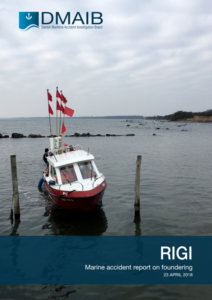The Danish Maritime Accident Investigation Board (DMAIB) has issued an investigation report on the sinking of the small German motorboat RIGI, in Faxe Bay, Denmark, about 1 nm from shore, in April 2018. The investigation showed that the choice of boat, its equipment, its operation, and its manning influenced the events on the day of the accident.
The incident
On 23 April 2018, the German recreational craft RIGI, a small motorboat, sank in Faxe Bay on the southeast coast of Zealand, Denmark, approx. 1 nm from shore.
Onboard was a team of three scientists who were conducting marine biotic research, and an observer representing the contractor of the research. The persons escaped the sinking boat and ended in the water.
They stayed by the boat in the hope that rescue assistance would arrive, but after a while they realized that their best chance of survival was to swim to shore and alert the rescue services there.
The team leader and the observer swam towards the shore, but only the team leader made it to shore, where passing local residents contacted the emergency call centre.
A rescue operation was launched and the remaining two scientists, who were still by the sunken boat, were rescued.
The observer was later found and recovered from the sea by a rescue helicopter, about 2 nm from the boat.
Despite receiving treatment both in the rescue helicopter and in hospital, she died, as incomplete donning of the immersion suit caused water to fill the suit and made it hard to move.
Safety issues
Exhaustion from moving through the water in the heavy suit, exposure to cold water and difficulties keeping the respiratory airways clear of the water were decisive circumstances for the fatality.
The report namely identified key issues relating to improper safety management:
- The focus of the emergency preparedness onboard RIGI was on the presence of individual pieces of equipment and did not consist of action plans comprising the process of how the equipment was to be utilised. There was a perception that this could be improvised if and when an emergency situation arose.
- The lack of maritime knowledge meant that the persons on board did not have insight into how the boat would react in case of flooding, and hence they did not have a realistic perception of the response time available for emergency communication and preparation for abandoning the ship.
- The lack of exercises meant that the persons onboard did not know how long it would take to utilise the emergency equipment. Hence, there was an unrecognised discrepancy between the time needed to put the emergency preparedness into force, and the available time for response in the emergency situation, which the preparedness was a response to.
- Across the project organisation, there was an acceptance that the emergency preparedness on RIGI differed from the standard described in the shared quality and safety management documents. The acceptance was based on the assumption that it was impossible for a small boat like RIGI to meet the same standards as those for larger commercial ships, and the perception that a small boat like RIGI operating close to the shore did not require the same scale of emergency preparedness.
- Hence, the acknowledged deviation from QMS became an acceptance of a lower safety standard by means of a reduced emergency preparedness instead of ensuring that an alternative emergency preparedness of an equivalent standard was provided.
- Therefore, the management of the safety for the employees of the project organisation on board RIGI did not correspond to a professional maritime standard.
Seen as a whole, the stakeholders underestimated the potential risks that were present when operating the small boat, and overestimated the possibility of recovering from a threatening situation. The accident, and the events that preceded it, show that the quality and safety management systems they had all prepared were not understood and/or did not work as intended. Thus, the professional standard that was needed to ensure a safe operation was not present.
Explore more herebelow:































































